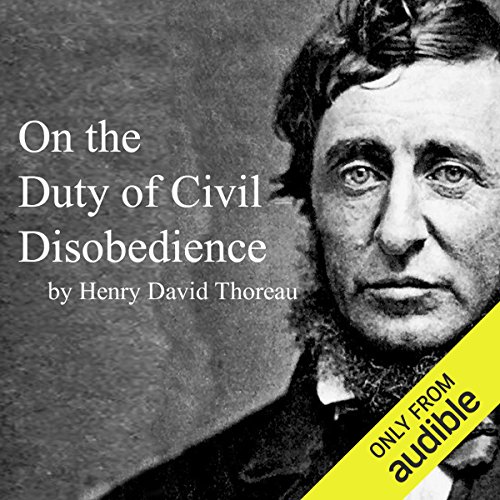On the Duty of Civil Disobedience
By: Henry David Thoreau
Narrated by: Jim Killavey

Length 1h 3m
Release date: 01-12-12
Publisher: Jimcin Recordings
Genre: History, Nonfiction, United States
My Rating: 4.25 of 5.0 Overall; Story 4.5; Narration 3.75
Publisher's Summary
This essay by Thoreau first published in 1849, argues that individuals should not permit governments to overrule their consciences. It goes on to say that individuals have a duty to avoid allowing the government to make them the agents of injustice. The quote: "That government is best which governs least," sometimes attributed to Thomas Jefferson or Thomas Paine, actually was first found in this essay. Thoreaus' thoughts were motivated by his disgust with slavery and the Mexican-American War but they are still relevant and resonate today.
Public Domain (P)2011 Jimcin Recordings
By: Henry David Thoreau
Narrated by: Jim Killavey

Length 1h 3m
Release date: 01-12-12
Publisher: Jimcin Recordings
Genre: History, Nonfiction, United States
My Rating: 4.25 of 5.0 Overall; Story 4.5; Narration 3.75
Publisher's Summary
This essay by Thoreau first published in 1849, argues that individuals should not permit governments to overrule their consciences. It goes on to say that individuals have a duty to avoid allowing the government to make them the agents of injustice. The quote: "That government is best which governs least," sometimes attributed to Thomas Jefferson or Thomas Paine, actually was first found in this essay. Thoreaus' thoughts were motivated by his disgust with slavery and the Mexican-American War but they are still relevant and resonate today.
Public Domain (P)2011 Jimcin Recordings
Review:
I had not read this essay in years. I was surprised how timely the message is. Thoreau questioned injustice and immorality supported by national government (particularly slavery and the Mexican-American War). Thoreau argues that each citizen must investigate and search out the facts if he believes that the government is acting unjustly. Thoreau espoused less government (see the quote in the blurb) and encouraged taking action to refuse to support unjust situations.
The underlying message of this essay is still applicable in modern day protests. One of the big differences though is that Thoreau did not promote violence, although he did not rule it out. Thoreau did not speak in favor of censorship but encouraged open debate.
It is interesting to learn (from outside research) that Thoreau exercised his right to civil disobedience by refusing to pay taxes for which he was jailed. A friend bailed him out by paying the taxes. I dd note from the essay (and independent research) that it is frustrating to know that civil disobedience might not change the policy or authority. I enjoyed reading this piece of historic writing and recommend it to anyone who finds public debate interesting.
Audio Notes: I found the narration by Jim Killavey to be clear but flat. I would recommend reading the text or looking for a different narrator.
Source: August 2021 Free Kindle and Audible for $.49. This qualifies for 2022TBR, 2022Audiobook, and 2022Alphabet goals.

No comments:
Post a Comment
Your comments are always appreciated!